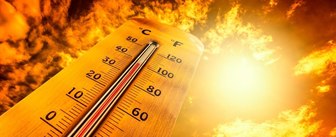In September 2021, the academic journal Nature surveyed the authors of the latest report by the Intergovernmental Panel on Climate Change (IPCC), the United Nations body that assesses climate research, about their views on climate change and the future. Ninety-two of the 233 living authors and review editors, who were charged with assessing the causes and extent of climate change, responded to Nature.
YouGov recently asked 1,000 Americans some of the same questions, with the goal of understanding how their views differ from those of the international climate researchers interviewed by Nature.
Our findings suggest that compared to climate scientists, Americans are less anxious about climate change, less likely to believe they’ll see catastrophic effects from it in their lifetime, and less likely to engage in climate-related activism.
The researchers interviewed by Nature (88%) were more likely than the overall U.S. population (61%) to say they think global warming constitutes a “crisis.”
While 66% of climate scientists surveyed said they expect to see catastrophic impacts of climate change in their lifetimes, only 25% of Americans said the same.
Americans were far less likely (35%) than experts (61%) to report experiencing anxiety, grief, or other distress because of concerns over climate change.
A similar share of American adults and climate scientists said that global warming has caused them to reconsider major life decisions, such as where to live (32% of U.S. adults and 41% of climate scientists) and whether to have children (18% of U.S. adults and 17% of climate scientists).
Unsurprisingly, the IPCC authors and editors were far more likely (66%) than American adults (25%) to say they engage in advocacy related to climate change.
- Carl Bialik contributed to this article
See the toplines and crosstabs for this U.S. News Poll
Nature Methodology: Nature e-mailed a survey in September 2021 to the 233 living authors and review editors listed in the Working Group I Sixth Assessment Report by the Intergovernmental Panel on Climate Change (IPCC; see https://go.nature.com/3nfvpz2). Respondents’ answers were anonymous; some people opted to share their names and emails for potential follow-up with Nature reporters. Ninety-two people responded, but some did not answer all the questions.
YouGov Methodology: This U.S. News survey was conducted by YouGov using a nationally representative sample of 1,000 U.S. adult citizens interviewed online between March 10 - 13, 2022. This sample was weighted according to gender, age, race, and education based on the 2018 American Community Survey, conducted by the U.S. Census Bureau, as well as 2016 and 2020 Presidential votes (or non-votes). Respondents were selected from YouGov’s opt-in panel to be representative of all U.S. citizens. The margin of error is approximately 3% for the entire sample.
Image: Getty










